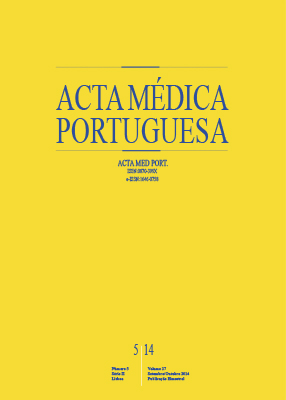Provocative Tests in the Diagnosis of Childhood Onset Growth Hormone Insufficiency
DOI:
https://doi.org/10.20344/amp.4878Abstract
Introduction: The incidence of short stature associated with growth hormone deficiency has been estimated to be about 1:4000 to 1:10000. It is the main indication for treatment with recombinant growth hormone.
Objectives: The aims of the study were to evaluate the results of growth hormone stimulation tests and identify the growth hormone deficiency predictors.
Material and Methods: A cross-sectional, analytical and observational study was conducted. We studied all the children and adolescents submitted to growth hormone pharmacological stimulation tests between January 2008 and May 2012. Growth hormone deficiency diagnosis was confirmed by two negatives growth hormone stimulation tests (growth hormone peak < 7 ng/ml). The statistical analysis was performed using student t-test, chi-square, Pearson correlation and logistic regression. Statistical significance determined at the 5% level (p ≤ 0.05).
Results: Pharmacological stimulation tests were performed in 89 patients, with a median age of 10 [3-17] years. Clonidine (n = 85) and insulin tolerance test (n = 4) were the first growth hormone stimulation tests performed. Growth hormone deficiency was confirmed in 22 cases. In cases with two growth hormone stimulation tests, the growth hormone peak showed a moderate correlation (r = 0.593, p = 0.01). In logistic regression model height (z-score) and the growth hormone peak in first stimulation test were predictors of growth hormone deficiency diagnosis (each one unit increase in z-score decrease the growth hormone deficiency probability).
Discussion: Measurement of IGF-1 cannot be used in diagnosing growth hormone deficiency.
Conclusion: Auxological criteria associated with a positive test seems to be a reliable diagnostic tool for growth hormone deficiency.
Keywords: Growth Disorders; Human Growth Hormone/blood.
Downloads
Downloads
Published
How to Cite
Issue
Section
License
All the articles published in the AMP are open access and comply with the requirements of funding agencies or academic institutions. The AMP is governed by the terms of the Creative Commons ‘Attribution – Non-Commercial Use - (CC-BY-NC)’ license, regarding the use by third parties.
It is the author’s responsibility to obtain approval for the reproduction of figures, tables, etc. from other publications.
Upon acceptance of an article for publication, the authors will be asked to complete the ICMJE “Copyright Liability and Copyright Sharing Statement “(http://www.actamedicaportuguesa.com/info/AMP-NormasPublicacao.pdf) and the “Declaration of Potential Conflicts of Interest” (http:// www.icmje.org/conflicts-of-interest). An e-mail will be sent to the corresponding author to acknowledge receipt of the manuscript.
After publication, the authors are authorised to make their articles available in repositories of their institutions of origin, as long as they always mention where they were published and according to the Creative Commons license.









